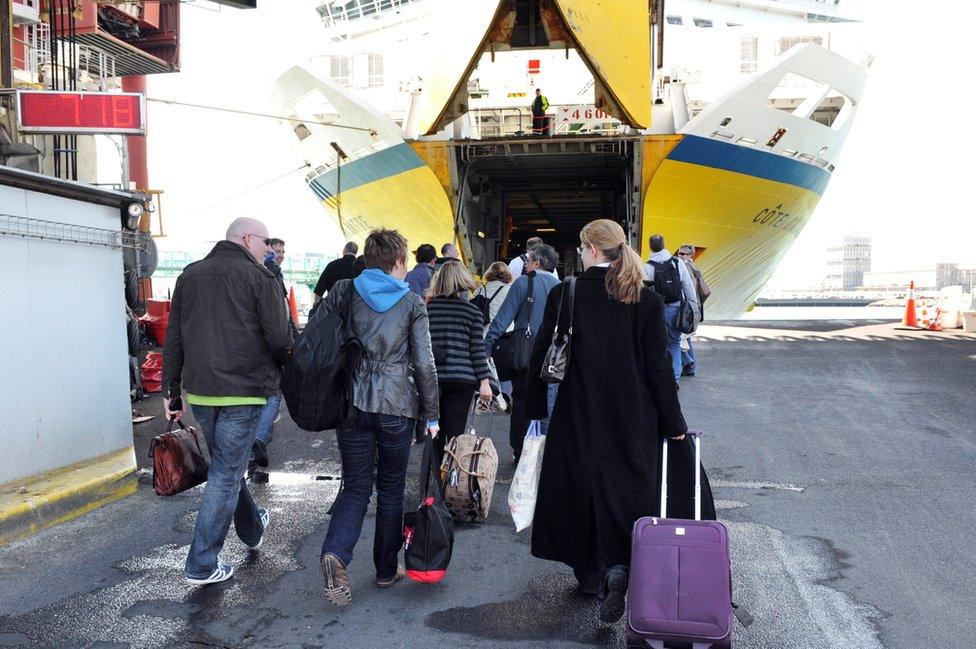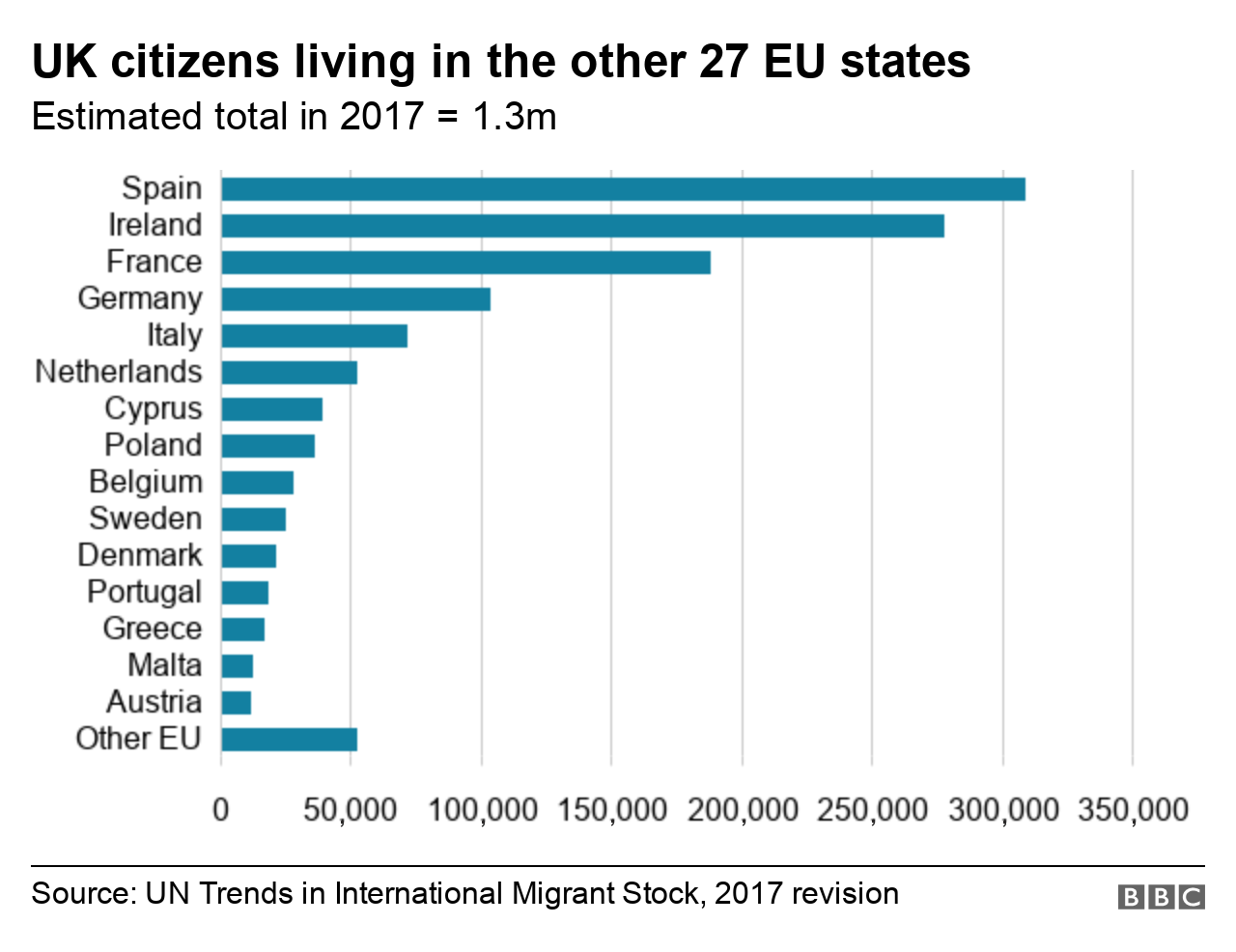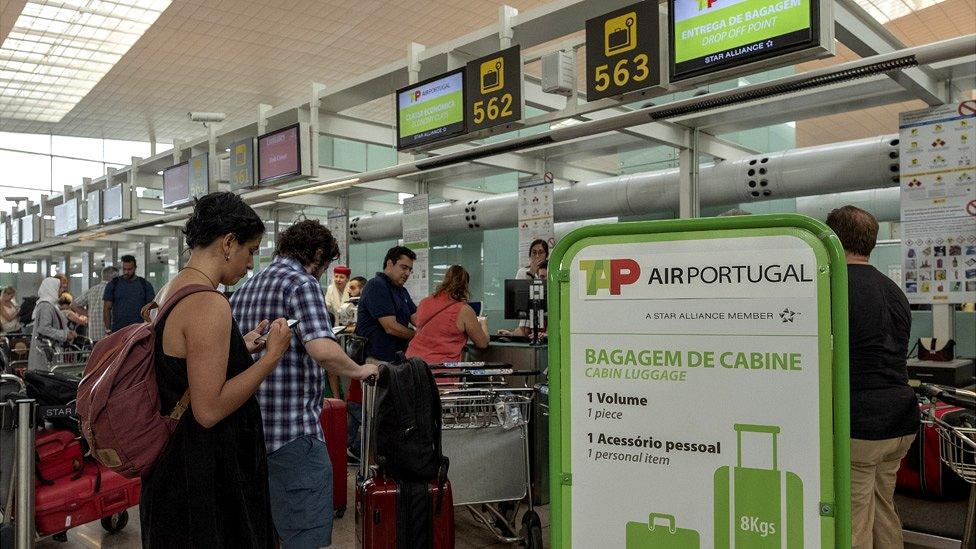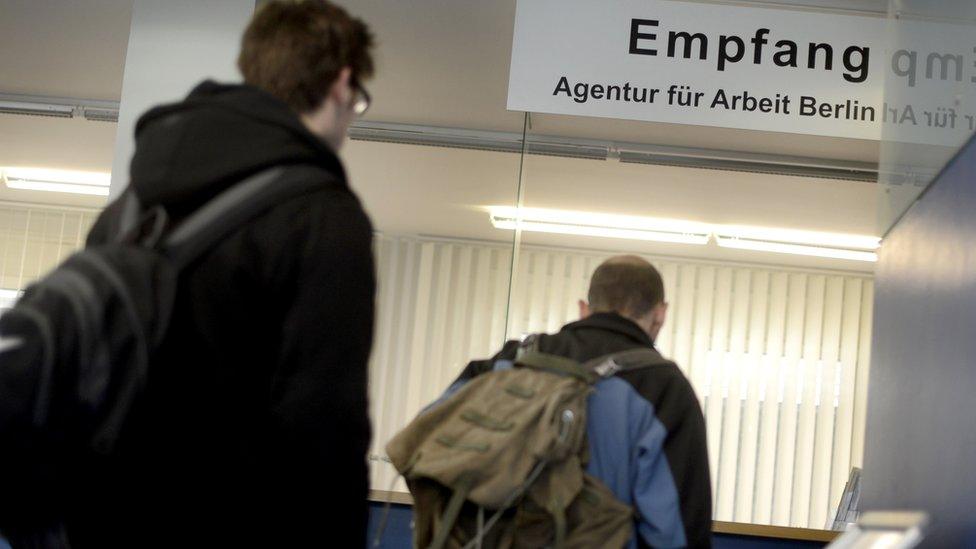Brexit: How would no deal affect UK citizens in the EU?
- Published

Trips across the Channel won't be the same for Britons and EU citizens
Prime Minister Boris Johnson has been keen to stress that the rights of EU citizens living in the UK will be protected in the case of a no-deal Brexit.
But the EU cannot give such a guarantee for UK citizens because it would be up to individual member states.
The Withdrawal Agreement, negotiated by former UK PM Theresa May, offers temporary guarantees for UK citizens in EU countries, but that has failed to get Parliamentary approval and a no-deal Brexit on 31 October is a very real possibility.
Under no deal, a host of things would change overnight - what critics call the "cliff edge". But here we will focus on the situation of Britons living in another EU country (in the EU27).
About 1.3m UK-born people are resident in the EU27, while the UK hosts about 3.2m EU27 nationals.
The withdrawal deal would enable them to keep their current freedom of movement and other EU citizenship rights, until 31 December 2020, when the Brexit transition period ends.
As for no deal, there is huge uncertainty about what it will mean for Britons living in France, Spain, Germany and elsewhere.
The priority for most will be to register as residents, but the rules - including deadlines for paperwork - vary from country to country.

The European Commission, in its contingency plan for no-deal Brexit, external, urges the EU27 to "take a generous approach to the rights of UK citizens in the EU, provided that this approach is reciprocated by the UK".
It says the EU27 "should adopt a pragmatic approach to granting temporary residence status".

There is uncertainty over how a no deal would affect flights in Europe
Travel
The Commission - the EU executive - has proposed visa-free travel for British visitors to the EU, provided the UK reciprocates.
Under the political declaration agreed alongside the withdrawal deal , externalthe UK says "the principle of free movement of persons between the Union and the United Kingdom will no longer apply" after the transition.
It speaks of "non-discrimination" and "full reciprocity" and says both sides "aim to provide, through their domestic laws, for visa-free travel for short-term visits".
However, that declaration is not legally binding; it spells out ambitions for the future UK-EU relationship, yet to be negotiated.
Under no deal, the declaration would be null and void. The UK would immediately be treated by the EU as a "third country" like other non-EU states.
So the rules for Britons in the EU could well be the same as for Americans or Chinese - it will depend on the rules of the individual member states.
Some of them have announced interim measures, external to protect UK citizens in the case of a no-deal Brexit, but they are generally only temporary, for example, Spain will offer transitional measures for 21 months after Brexit, Germany offers protection for nine months and France will put them in place for one year.

British workers are integral to Airbus airliner production in Europe
Work and study
No deal would immediately hit Britons whose work currently takes them to more than one EU country.
They would no longer be on a level playing field vis-a-vis EU citizens, who can easily move to another EU country and start a new job there. For Britons, post-Brexit, there will be more bureaucracy.
Mobility in Europe is important for many private sector workers, especially in the tech sector, such as computer game designers, external.
Specialists involved in pan-European research projects also need to be able to travel easily across the EU, often at short notice.
Daniel Tetlow of campaign group British in Germany, external says "Brits are now being discriminated against in job applications".
Post-Brexit, he said: "I have the right only to continue working in Germany - I'm effectively landlocked.
"This has huge career implications for all UK citizens, not just those living in the EU, as is often misunderstood," he told the BBC. British in Germany is part of the coalition British in Europe.
It is not clear which UK professional qualifications will be recognised in the EU post-Brexit, and vice versa. Those details are yet to be negotiated.
Under the withdrawal deal, British students in the EU27 can continue under the current system. But from 2021 they may face much higher tuition fees - those that non-EU students have to pay. Only Germany and Norway (which applies EU rules) offer free tuition for international students.

Job search in Berlin: Conditions will change for British jobseekers
Healthcare
No deal would mean the current reciprocal healthcare, shared by the UK and the EU27, would no longer apply.
It could send health insurance premiums soaring for UK citizens who need sufficient cover for holidays or work in the EU.
No deal would most likely delay the registration of some medicines and/or delivery of them.
Britons could find their European Health Insurance Card (EHIC) - a passport to emergency medical treatment - is no longer valid in some EU countries.
Social security and pensions
The House of Commons Library says, external that post-Brexit, if a UK national moves to the EU, access to benefits will depend on the host country's immigration policy and the terms of any bilateral social security agreement it has with the UK.
In the EU, social security contributions are co-ordinated. So someone who has worked in more than one member state can make just one application to the relevant agency where they are living when they reach pension age. That agency notifies any other EU state where the individual has worked, and the national insurance contribution that he/she paid there becomes part of the pension.
That reciprocity disappears under a no-deal scenario. It is not clear whether any old bilateral UK deals with individual EU states on social security will be revived.
The UK tax treatment of overseas pension transfers could change post-Brexit. Transfers from the UK to non-EU countries have been subject to a 25% UK "overseas tax charge" since 2017. There is no guarantee that tax-free transfers will continue for UK pensioners living in the EU.

Benalmádena, Costa del Sol: British pensioners face Brexit uncertainty
What about the EU27 countries where most UK citizens live?
Spain
Of the estimated 310,000 Britons living in Spain, about 65,000 are resident and in permanent work. About one-third of the 310,000 are pensioners.
No deal would be much less of a problem for a Briton with dual nationality. But Spain does not allow it - except for veterans of the 1930s left-wing International Brigades and Sephardi Jews who can prove a family connection with Spain. For other Britons, acquiring Spanish citizenship means surrendering a UK passport.
"Third country" nationals in Spain have to prove annual income of at least €26,000 (£23,000; $30,000) to remain legally resident - and that could be a problem for some British pensioners, post-Brexit.
Spain is offering a 21-month grace period of protection for UK nationals, after which proof of residence will be needed.
Ireland
Whatever happens, both governments say, the Common Travel Area (CTA) will remain in force. That is a relief for Britons living in Ireland and the people of Northern Ireland.
Under the CTA, Irish and British citizens can travel and work freely in both countries. It is also recognised by the EU.
The big risk is that no deal could bring back a "hard" Northern Ireland border - something the withdrawal deal goes to great lengths to prevent, with the controversial backstop plan.
France
French MPs have granted the government emergency powers to issue decrees in the event of a no-deal Brexit.
The government says it will not impose visas on British visitors, provided the UK government also maintains visa-free travel.
Britons living in France will have their rights protected for a one-year transitional period, and will have to apply for a residence permit in the first six months.
Germany
From 31 October - in the event of no deal - Britons will have nine months to register for a new residence permit.
The bureaucratic formalities vary from one German state to the next, under the federal system.
Berlin has the largest number of Britons - there has been a big influx since the 2016 Brexit referendum.